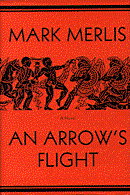
Gay/Lesbian/Feminist Bookstores Around the Country
The Mostly Unfabulous Homepage of Ethan Green
![]()


An Arrow's Flight
From chapter 8, Pyrrhus' origins: fabulous and even divine
Anyone's origins are fabulous. As a child Leucon used to listen, rapt, to the tale of how his parents met at college, courted, married. This homely story was magical, partly because the picture of his parents as lovers was as difficult to conjure as, say, Europa and the bull; but mostly because the story ended with Leucon. His mother might have met somebody else, Leucon might have been entirely different: handsome, rich. Straight. Yet here he was, the culmination of some frantically busy weaving at the fringes of the web of Destiny.
No less magical -- but no more, either, only just as much -- was the myth of Pyrrhus's beginnings, the story from Phoenix, the few additional details Leucon was able to elicit from Pyrrhus himself until he clammed up. How his grandmother was a goddess who married a mortal and bore a son. How that son dodged the draft by hiding out on Scyros. How he met Pyrrhus's mother there and, in due course though without ceremony, produced Pyrrhus. To Leucon, the goddess bit might have been the wondrous part of the story, but of course to Pyrrhus the wondrous part was that he had come to exist. The rest he seemed to take more or less for granted.
We are accustomed to thinking of history as having some main events and a great many sideshows. Achilles and Pyrrhus and a few others are in the center ring: everything that happened from the birth of the world led inexorably to the war, everything that has happened since the war is, simply, the postwar. The great heroes are at the heart of the tapestry, the place where every thread comes together in one impossibly intricate knot and the gods themselves condescend to join in the weaving. While Leucon, and you and I, are off at the periphery somewhere.
Of course there is no periphery. If I had titled this volume Leucon, I might have shown you how every heavenly power conspired to bring Leucon into being, how every time he belched or broke something he set off a chain of events that built empires and then leveled them. He was just as important as Pyrrhus.
Except he didn't think so. He might have conceived, at one point in his sophomore year, the smashing idea every sophomore sooner or later stumbles on: that the world came into being the day he opened his eyes, that it was all created to baffle or amuse him. He got over it, as most of us do. He exiled himself to the edge of history, where nothing he did mattered very much. So he was excited by the news from Phoenix, pleased to find himself a minor character in the epic of Pyrrhus.
And aggravated that Pyrrhus wouldn't let him play even his supporting part. He wanted to know everything: how it felt to be sort of divine, what it was like to grow up a prince, with a heroic father and all. Pyrrhus answered only in monosyllables. As if Leucon's interest in the astonishing news of his identity were somehow...vulgar. It was vulgar for Leucon, even jokingly, to call Pyrrhus Neoptolemus. It would have been supremely vulgar for Leucon to remark -- as he very nearly did -- that Pyrrhus had a famous father and a wealthy family and had evidently been playing some sort of protracted game. That, for example, his ostentatious casualness about the rent last fall had been well founded; how it must have amused him to watch Leucon worrying about money.
A few withering looks from Pyrrhus were all it took to make Leucon's position plain. He was so trivial, so minor a figure in the hero's story, that he could not participate even vicariously. He was not to speak of it; he had to pretend he had learned nothing. Above all, he was not to mention Achilles. If he dared to utter the name, Pyrrhus seemed to shut down. As, when you turn off the television, the image shrinks to a faint blue point, then vanishes: so Pyrrhus's face when Achilles' name was came up. After one or two times of that, the name just seemed to hover in the air between them. Leucon and Pyrrhus were so doggedly silent about Achilles that he might as well have been sitting in the living room with them.
Pyrrhus had been ten when Achilles left, old enough positively to revel in his departure. Though Achilles had seldom bothered to strike him or even speak to him, Pyrrhus had already lived for years under the cloud of his father's contempt. Every room in the house was filled with it; even the backyard was strewn, in place of crabgrass, with markers of the sites where Pyrrhus had let his father down, declining to catch the ball, falling off the bicycle, refusing to run when he was It. That especially, refusing to run because you couldn't outrun Achilles, and there was that awful feeling as he got closer and closer. Even if you knew all he was going to do was tag you (too roughly), you felt the way some hapless Trojan boy would have. Running, the sun at your back, seeing on the ground before you your own shadow and Achilles', his shadow growing until it swallowed yours up: you turned and knew you had seen the last of the sun.
He had lived in the shadow every day for the first ten years of his life. Every moment of pleasure or self-esteem, every hour in the company of his mother or alone, reading or playing, eclipsed by the possibility that his father would appear to destroy it. His life could be lived only when he was out of his father's sight. He could he not have felt -- when Achilles got into the limo with Odysseus and Ajax, not even saying goodbye to the mock family that was, to him, just part of the disguise he had worn on Scyros -- how could Pyrrhus not have felt that a cloud had passed from his world? He had been discharged from the eternal boot camp of the bungalow to a palace where he was at last free to be himself.
His negligible, despicable self. It was too late, probably, even ten was too late. He must already have acquired the habit of invisibility, keeping himself out of anybody's sight, not just his father's. As if anybody at all who looked at Pyrrhus would see what his father had seen. Or hadn't seen: the vacancy, the hole where Achilles might have said valor should have been, where I have said scruples were lacking -- both a little off the point.
I can't see far enough into him. I feel...vulgar even guessing. But maybe what was missing was the sense that there was anything worth trying, suffering, resisting for, so that he wouldn't wrestle with his father or with his conscience. Nothing good would come to him because his father's power would take it from him. Or everything good would come to him through fate or luck or magic. Maybe he felt both those things, learning one from Achilles and the other from Thetis. Or maybe Thetis never visited him, her message just grew up in him, his vague and grandiose sense of entitlement just a child's invented light to dispel his father's shadow. I am guessing. Maybe the way we usually guess about other people, by turning them into ourselves.
I don't suppose Pyrrhus actually thought of Achilles much, all those years when he was out of sight. It didn't matter: Achilles was alive somewhere, those many years. There had always been, somewhere, one man who had seen straight into Pyrrhus and found him...insufficient. There had never been anywhere he was out of his father's sight.
And now, with his father safely in Hell? The shadow gone and unmourned, now surely he could begin to live, come out of hiding? Except now he would never hear his father say...
Somewhere he must always have harbored the wan hope that he would hear -- maybe this is what the hole was after all: the place in him waiting for those words -- that he was all right. That his father had seen him, seen into him, and had assented to his existence. Now that hole would never be filled. Nothing he could do, or refuse to do, would ever make a difference. Achilles would never stride naked and radiant into the room, lift up the infant Pyrrhus, and whisper to him: I have seen you, and you are good.
Is it any wonder that -- ten years into the war and no end in sight -- the Greeks had sent Phoenix to fetch him? Isn't it just such a man who burned cities?
More from An Arrow's Flight :
- Introduction: The Trojan War, blending ancient headlines and modern myths.
- From Chapter 1: Meet Pyrrus, our hero, strutting his stuff in a Grecian strip club.
- From Chapter 2: Flashback to the life of young price Pyrrhus, dreaming of Troy.
- From Chapter 7: Pyrrhus discovers an unexpected guest in his bedroom.
- Exclusive! Interview with the Author: Mark Merlis discusses his interests, influences, and intentions.
 Back
to the Stonewall Inn
Back
to the Stonewall Inn
